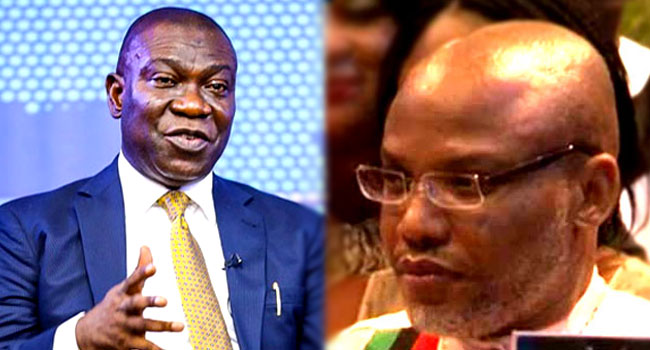Former Deputy Senate President, Ike Ekweremadu, has proposed a political solution that would see to the release of the detained leader of the Indigenous People of Biafra (IPOB), Nnamdi Kanu.
The Senator pointed out that he believes this can be achieved as the South-East Caucus in the National Assembly prepares to intervene in the matter.
‘We expect that ultimately, we find a political solution in respect of Nnamdi Kanu’s problem,’ he said during an interview on Channels Television’s Hard Copy which was monitored by Africa Today News, New York on Friday.
‘In the past, we have done similar things. What we want to see is to make sure that the Federal Government understands the feeling of our people.’
‘It is not easy to predict right now, but what we want to see is to reduce tension in the South-East,‘ the lawmaker said in response to a question about the motive of the caucus to intervene in the matter.
Read Also: IPOB’s Sit-At-Home Order Counter-Productive – Orji Kalu
The lawmaker recalled when the leader of the Movement for the Actualisation of the Sovereign State of Biafra (MASSOB), Ralph Uwazuruike, was arrested during the administration of former President Olusegun Obasanjo.
He explained that during the administration of former President Musa Yar’Adua, he visited the late leader, alongside some senators, who invited the then minister of justice – a political development that led to Uwazuruike’s release.
‘When Uwazuruike was detained by Obasanjo, there was tension until Yar’Adua came… eventually, we ended up in a political solution and Uwaruzuike was released. The same thing with Nnamdi Kanu, when he was detained, I also led a delegation to meet the President.
‘We expect that just as we had some results in the past, maybe we should come out with something that should be acceptable by all the parties,’ Ekweremadu added.
Africa Today News, New York understands that calls for a separate state of Biafra are usually a sensitive subject in Nigeria after a unilateral declaration of independence in 1967 sparked a brutal 30-month civil war.
More than one million people died, most of them Igbos, from the impact of conflict, hunger and disease.
Recently, the South-East region witnessed a chain of violence with attacks on several police stations and electoral facilities – incidents which authorities blamed on IPOB and its armed wing, the Eastern Security Network (ESN). But IPOB has repeatedly denied responsibility.
AFRICA TODAY NEWS, NEW YORK

